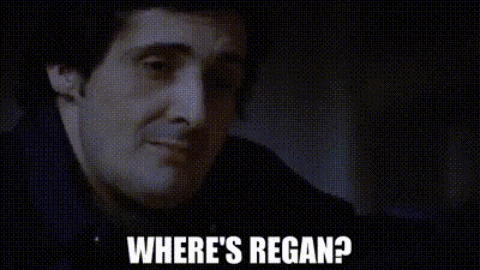 “Where’s Reagan?”
“Where’s Reagan?”MOYERS:
Look, I have grief, but I don’t write poems.
What do I do about it?
BLY:
I don’t know that you have to do something with it, but I think it’s a choice at any second.
You know, in a conversation there are little turns, you can turn up or down.
Someone says, you know,
“I lost my brother five years ago.”
At that point, you know, you can say,
“Well, we all lose our brothers,”
or you can touch a hand,
or you can go into the part of you that’s lost a brother.
You can follow the grief downward in this way, or you can upward in The American Way.
You can always tell an American on the streets of Europe, because he’s smiling.
So it’s really important for us. I mean, we hired three presidents in a row who promised us that we would not go into the grief about the Vietnam War.
Carter and Reagan and then Bush Ford; four of them in a row.
And if Lincoln had been alive, do you know how he would have gone into that grief?
He would have gotten everybody you know, five years after the Vietnam War, and he would have said,
“We’ve killed so many people, and these veterans are here, we have destroyed them aah, let’s all weep
Aaah, Aaah, Aaah.”
That’s what Lincoln would have done. He would have encouraged America to grieve over the losses in the Vietnam War.
We still haven’t grieved over that.
Only the veterans are grieving.
This is not right.
MOYERS:
How does a whole people grieve?
BLY:
Well, we don’t do it by hiring people like Reagan, who you know —
Reagan’s father was an alcoholic, and when I look at Reagan, I know he has not gone through the grief of that.
So he’s in denial.
When you’re in denial over your own father, you can deny the budget deficit easily.
That’s not a problem.
He is the first president we’ve ever had who has spent the whole presidency in denial, and the result is we’ve got all the Homeless sleeping on the vents,
we’ve got what a $3 trillion deficit.
That’s what it’s like when you decide not to, when you decide not to take that turn down.
You decide not to go and face your father and do that work.
Then you get Reagan.
And so it’s a very serious thing, because we knew all of that when we hired him, in some way.
And if we are so co-dependent as a nation that we’ll hire this man who didn’t go through the “adult children of alcoholic work,” or whatever that is, that doesn’t speak well for our future.
MOYERS:
This is territory I’m not very competent to enter, but America never really has come to terms with the shadow of its past.
BLY:
That’s right.
MOYERS:
The Indians, The Blacks.
BLY:
We didn’t mourn over the death of the Indians, and we didn’t mourn I think, you know, Lincoln and Whitman, Lincoln felt that mourning in Whitman, or Whitman in Lincoln.
And they did moderately well in mourning the Civil War.
But after that, it’s been a process of not mourning, you know.
Alexander Mitschlich in Germany has written a book called The Inability to Mourn, about the Germans, after the Second World War.
Now, we’re in that same situation.
We have an inability to mourn.
So again, you see, how can we have men or women if we can’t go into grief at all?
No comments:
Post a Comment